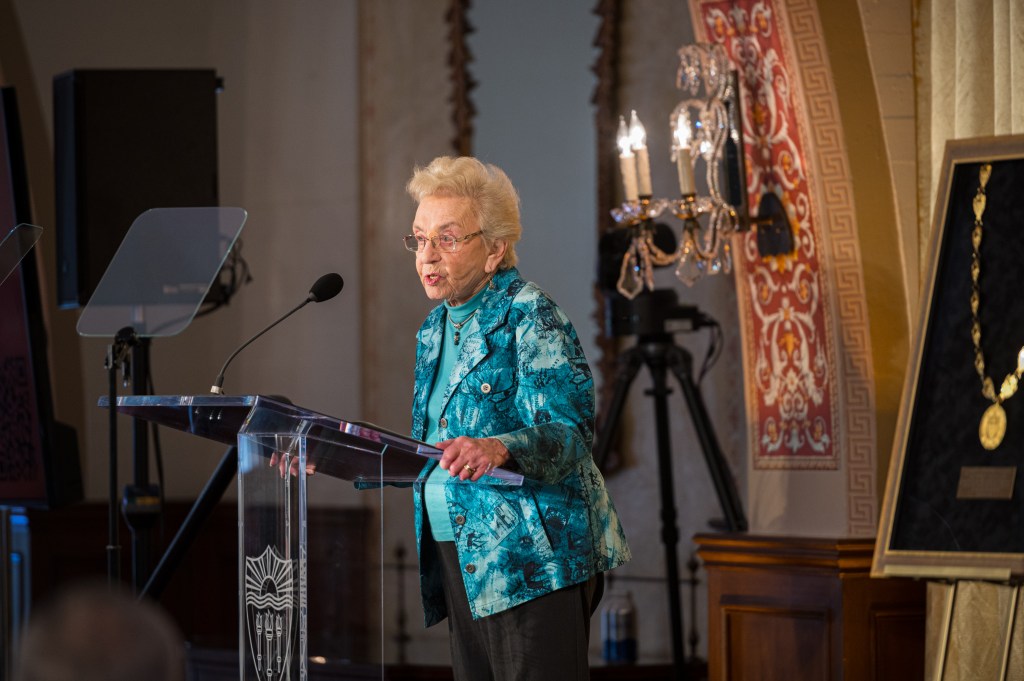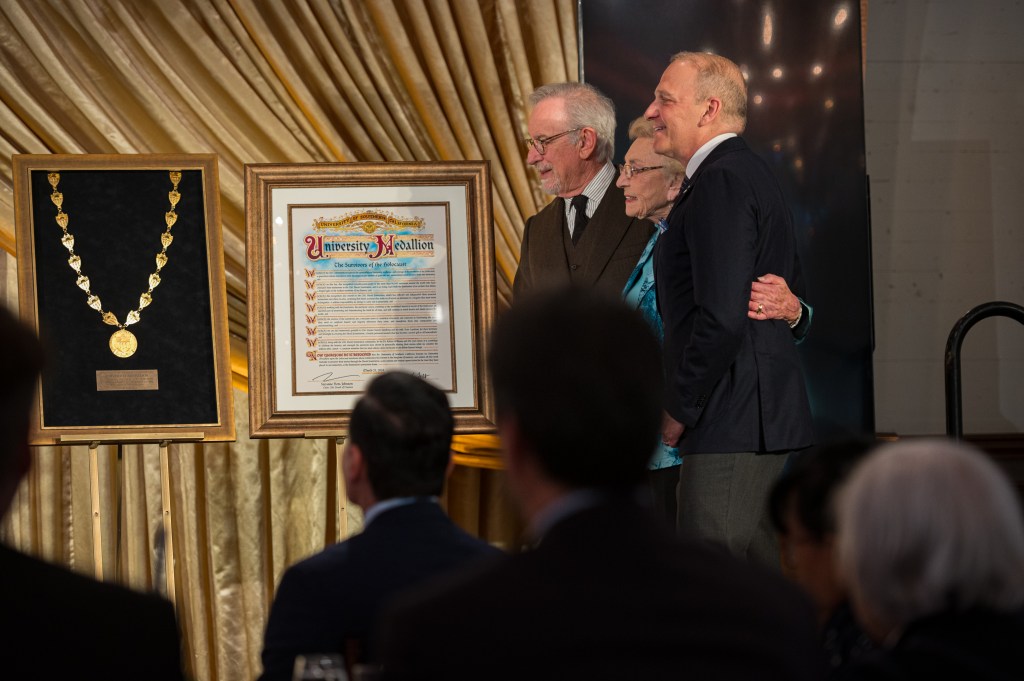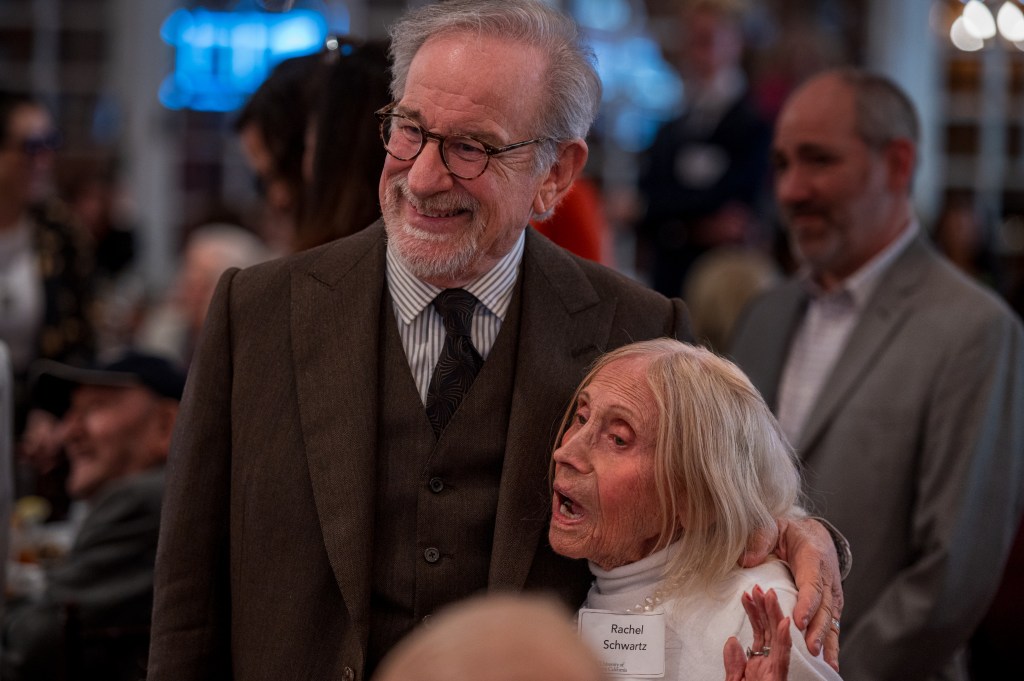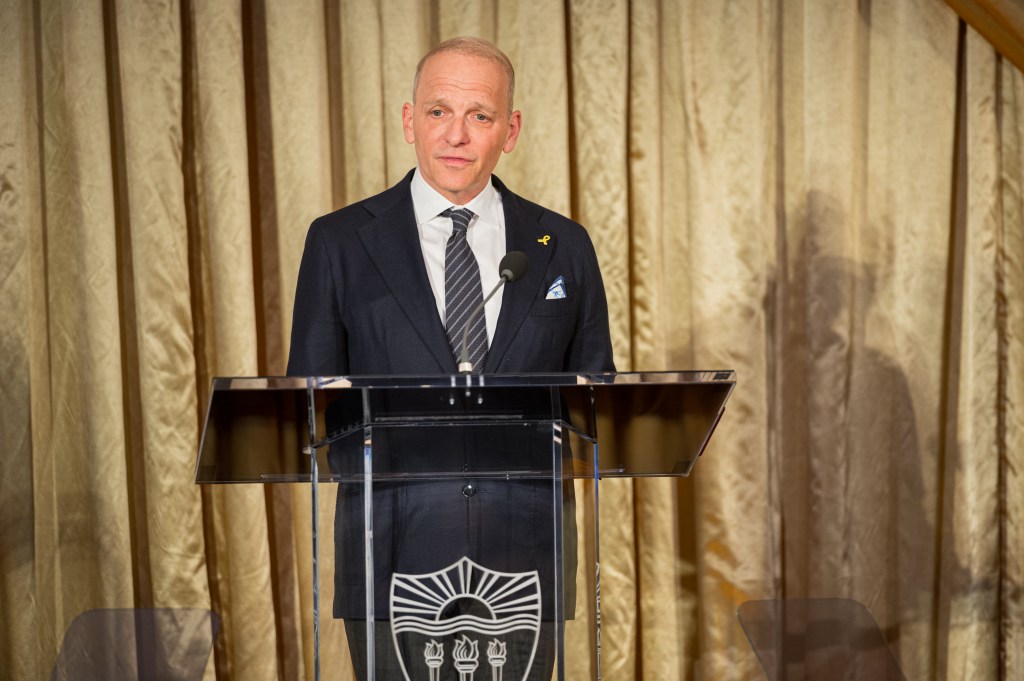Celina Biniaz, who at 93 is the youngest of the 1,200 people saved by Oskar Schindler in 1944, walked slowly to the podium as the ballroom collapsed anyway. In her presence, the audience of about 265 people who gathered Monday on the USC campus were eager to watch living history unfold on stage, no doubt with memories of family and friends lost during World War II in their midst. minds. Spectators included 30 Holocaust survivors.
“Oskar Schindler saved my life by adding my name and that of my parents to the list of employees who will be protected from Nazi deportation. And 50 years later, you, Steven (Spielberg), recorded my life, giving me back my voice,” Biniaz said of the German businessman whose incredible story of saving Jews during World War II was documented in Steven Spielberg’s 1993 landmark film, “Schindler’s List. ”
Biniaz was in attendance at USC’s City and Robe Ballroom for the current Spielberg, the Oscar-winning director and founder of the Shoah Foundation, with the university’s highest honor, the USC College Medallion, awarded to the famed filmmaker for his work on behalf of survivors of the Holocaust. whose stories have been documented over the past 30 years by the Shoah Foundation.

Holocaust survivor Celina Biniaz speaks during the USC College Medallion presentation on Monday.
Sean Dube
Biniaz is among 56,000 people whose stories have been immortalized by the USC Shoah Foundation. Based by Steven Spielberg in 1994, right after “Schindler’s List”, the muse is dedicated to collecting and preserving private testimonies from Holocaust survivors.
Biniaz continued: “For a few years… I didn’t discuss the Holocaust at all. Even my children (didn’t know) that I was a Holocaust survivor, because I didn’t want them to relive my initial trauma. That changed when I saw Schindler’s listing in 1993. Steven, you gave me my voice back. Thanks to your film and the Shoah Foundation, I was able to confront my experiences and discuss them.”
On Monday, Spielberg, Biniaz and Joel Citron, chairman of the board of directors of the USC Shoah Foundation, accepted the medallion from USC President Carol Folt. The kudo has only been awarded three different times in USC’s 144-year history.

Spielberg, Biniaz and Citron accepting USC College medallion
Sean Dube
“The 56,000 testimonies of Holocaust survivors are one of the greatest contributions to humanity,” Folt said in his opening remarks. “And as I look around this wonderful room, knowing that I am seeing survivors and families and so many people dedicated to this mission and function of the USC Shoah Foundation, I would like to say to each of you how grateful we are to be selfless in sharing what we all we know they are such deeply painful memories.”
Spielberg took the stage, greeted by applause from many survivors who knew him through the work of the Shoah Foundation, survivors reminiscent of those who first inspired the creation of the muse in 1993. While filming “Schindler’s List,” survivors from Poland offered to share their experiences with the horrors of the Holocaust with the director. These recordings planted the seeds of what became the Shoah Foundation’s primary mission – documenting the stories of those who lived during the Holocaust era.
“By courageously stepping forward to share these stories on camera, a permanent record will be preserved for families, for history, for the school and for each future generation. This grew to become my mission. This grew to become our work and became the Shoah Base. And here we are, 30 years later, still determined to give those voices every opportunity to be heard,” said Spielberg.

Steven Spielberg with survivor Rachel Schwartz
Sean Dube
Monday’s meeting was especially important to people because of the rise in anti-Semitism that followed the Hamas terrorist attacks on Oct. 7, which resulted in the greatest loss of Jewish life since the Holocaust. Spielberg did not hesitate to denounce the devastating consequences of the conflict, which include more than 31,000 Palestinian civilian casualties and increases.
“I am increasingly alarmed that we may be condemned to repeat history, to fight once again for the right to be Jewish. In the face of brutality and persecution, we have always been resilient, compassionate people who understand the power of empathy,” said Spielberg. “We will rage against the heinous acts committed by the October 7 terrorists and also condemn the murder of harmless women and children in Gaza. That makes us a unique force for good on the planet and that’s why we’re here right now to celebrate the work of the Shoah Foundation, which is more important now than it ever was in 1994.”
Citron, whose parents are Holocaust survivors, was visiting her mother in Israel during the October 7 attacks. Since then, he has led the work of collecting survivor accounts as part of the USC Shoah Foundation’s Combating Anti-Semitism by Testimony Suite, which documents experiences of anti-Semitism after 1954.

Citron speaking at the USC College Medallion presentation
Sean Dube
Echoing the emotions of his fellow speakers, he assured the group that Base Shoah’s work would not be deterred by any acts of discrimination and violence against the Jewish group.
“I promise you that we will work harder than ever to teach people to become more tolerant and to combat hate in all its forms,” Citron said. “We understand and accept the higher duty that survivors have entrusted to us through their testimonies and their stories, tirelessly pursuing a quest to make the world just a little bit better every day.”






